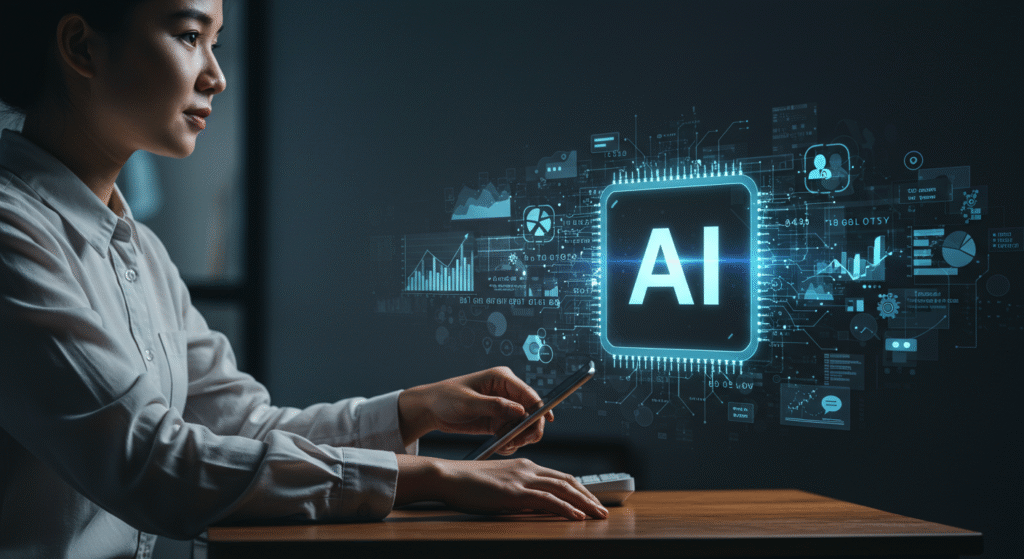Artificial Intelligence (AI) is no longer a futuristic concept—it’s the beating heart of modern marketing strategies. From personalized content recommendations to predictive analytics, AI has revolutionized how brands engage with customers, optimize campaigns, and drive growth. In today’s competitive digital landscape, AI in marketing is not a luxury—it’s a necessity.
What is AI in Marketing?
AI in marketing refers to the use of artificial intelligence technologies—like machine learning, natural language processing, and data analytics—to automate, improve, and personalize marketing efforts. These tools analyze vast amounts of consumer data to predict behavior, deliver targeted content, and optimize customer journeys across channels.
Key Applications of AI in Marketing
1. Personalization at Scale
AI helps marketers create personalized content and product recommendations based on real-time user behavior, demographics, and preferences.
- Example: Netflix and Amazon use AI algorithms to recommend shows and products tailored to each user.
- Benefit: Higher engagement, increased conversions, and improved customer loyalty.
2. Chatbots and Customer Support
AI-powered chatbots provide 24/7 customer support, answering questions, solving problems, and guiding users through the sales funnel.
- Example: Many e-commerce sites use AI chatbots like Drift or Intercom to engage visitors instantly.
- Benefit: Reduces response time, saves costs, and enhances user experience.
3. Predictive Analytics
AI analyzes past customer data to predict future behavior, enabling smarter campaign planning and targeting.
- Example: Email marketing platforms use AI to determine the best time to send emails or which subject lines will perform better.
- Benefit: Improved ROI and campaign effectiveness.
4. Content Creation and Optimization
AI tools can assist in creating content such as blog posts, social media captions, and even video scripts. They also optimize content for SEO and readability.
- Example: Tools like ChatGPT, Jasper, and Grammarly help marketers write faster and smarter.
- Benefit: Saves time and maintains consistent quality.
5. Ad Targeting and Media Buying
AI helps automate media buying decisions by analyzing which platforms, formats, and audiences will yield the best results.
- Example: Facebook Ads and Google Ads use AI to automatically optimize ad delivery and targeting.
- Benefit: Maximizes ad spend efficiency and reach.
Benefits of Using AI in Marketing
- ✅ Enhanced Customer Experience – AI enables real-time interactions and personalized content.
- ✅ Increased Efficiency – Automates repetitive tasks and frees up time for strategic work.
- ✅ Data-Driven Decisions – AI turns big data into actionable insights.
- ✅ Scalable Solutions – AI systems grow with your business needs without adding workload.
- ✅ Improved ROI – Targeted campaigns and predictive analytics reduce waste and boost performance.
Challenges of AI in Marketing
Despite its advantages, AI is not without challenges:
- ⚠️ Privacy Concerns: Handling user data responsibly is critical to avoid trust issues.
- ⚠️ Cost of Implementation: Advanced AI tools may require investment and integration with existing systems.
- ⚠️ Dependence on Quality Data: Poor-quality data can lead to inaccurate predictions and flawed strategies.
- ⚠️ Human Oversight Needed: AI still requires human guidance for ethics, creativity, and brand tone.
The Future of AI in Marketing
The future of marketing is hyper-personalized, automated, and data-driven. With advances in AI, we can expect:
- Deeper emotional intelligence and tone analysis in customer communication.
- Smarter voice search and AI-generated videos.
- Fully automated content funnels powered by real-time behavior tracking.
- Ethical AI practices focusing on transparency and fairness.
Final Thoughts
AI in marketing is not about replacing human creativity—it’s about amplifying it. Marketers who embrace AI tools today are not just staying current—they are preparing for a smarter, faster, and more intuitive future of customer engagement.
Whether you’re a small business owner or a marketing executive, integrating AI into your strategy will unlock new possibilities and keep your brand ahead of the curve.


